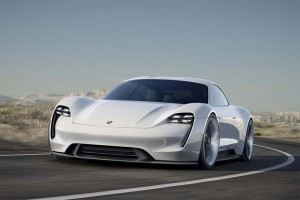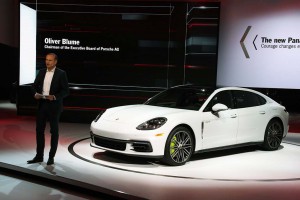
Porsche's new Mission E performance electric vehicle is set provide some stiff competition for the Tesla Model S P100D.
Not that it didn’t seem official before, but Porsche is getting out of the diesel engine business in favor of battery-electric powertrains. This will make Porsche the first German automaker to dump diesels entirely.
The company, which is owned by Volkswagen AG, has been slowly divesting its line-up of diesel powerplants for the last couple of years. This was highlighted by the lack of a diesel for the next-gen Cayenne when it debuted last fall.
Now the Macan and Panamera models equipped with diesels are no longer available with a “no new diesel will be engineered” edict for the Macan S. The move is part of a “cultural shift” a Porsche spokesperson told AutoCar magazine.
Unsurprisingly, the problems for Porsche and diesels began with the 3.0-liter engine it gets from parent VW. The engine is one of two diesels that were found to have used a “cheat device” to pass U.S. emissions tests.
(Porsche plugging in: Half its Line-up will be electrified. Click Here for the story.)
The scam was discovered, and the problem proliferated around the world, costing VW more than $30 billion in fines, fees and penalties. Porsche, as well as premium brand Audi, were caught in the diesel tsunami.
Porsche signaled its intentions to integrate a battery-electric model into its line-up when it introduced the Mission E concept. The company furthered those efforts with its hybrid-powered supercar, the 918.
The company’s efforts toward electrification are more than just talk as its invested $1 billion to develop the Mission E sedan, which is slated to hit roads in 2019. Essentially, Porsche’s answer to Tesla, the new model will be priced at $85,000, sprint 0-60 mph under 3.5 seconds, enjoy a range of 310 miles and boast a top speed of at least 155 mph.
(Click Here to see Porsche’s four new models it rolled out.)
Further, Porsche and Audi are planning a shared electric-car platform for multiple models beginning in 2021. Porsche CEO Oliver Blume and Audi CEO Rupert Stadler confirmed the plan in an interview with the Stuttgarter Zeitung recently. Perhaps most important, the new shared platform is separate from the Porsche’s current electric-car development program. Blume estimated the new platform will be 30% cheaper than if tackled alone.
Porsche executives have said electric vehicles should account for a quarter of yearly Porsche sales by 2025, largely because of the new shared platform with Audi. However, the company’s current electrified models, such as the Panamera Turbo S E-Hybrid have also been well received.
The Panamera line offers two hybrids with both variants traveling up to 30 miles in electric-only mode. The top-of-the-line Turbo S E-Hybrid sports 4.0-liter V8 engine and an electric motor generating a total system power of 680 hp.
(To see how the Mission E causes problems for Tesla and the Model 3, Click Here.)
The sports car maker is looking to make inroads in its largest market, the U.S., in other ways too. Porsche is also working with all 189 dealer partners to install fast-charging infrastructure for customers. Six rapid chargers have just been installed at the Porsche Experience Center in Atlanta, with the Los Angeles experience center to follow. Porsche is also working with other organizations on a network of DC fast-chargers for U.S. cities and highways.


My Italian magazines (in my city 80% of cars are diesel) are showing two page ads from VW-Audi that “from 5/31/2018 methane is a Noble Gas with the gamma g-tron”. EV’s aren’t mentioned but clearly a new focus is in the works.